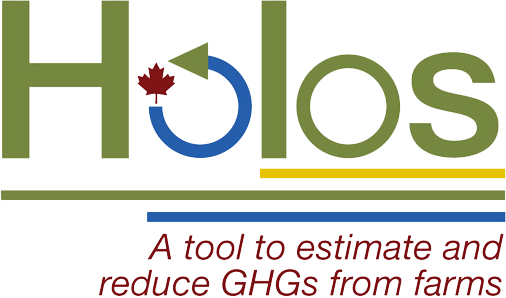HOLOS v.4 Workshop

Instructor: Roland Kroebel, Research Scientist,
AAFC Lethbridge, AB
Holos is a whole-farm model and software program that estimates greenhouse gas (GHG) emissions based on information entered for individual farms. The main purpose of Holos is to test possible ways of reducing GHG emissions from farms and is available at no cost to users. Users can select scenarios and farm management practices that best describe their operation and then adjust these practices to see the effect on carbon dioxide, nitrous oxide and methane emissions. Examples of these adjustments include changing livestock feed, reducing tillage, manure management or cropping systems that include perennial forages in rotation. Carbon storage and loss from lineal tree plantings and changes in land use and management are also estimated. The result is a greenhouse gas emission estimate for the whole farm that can help the user identify ways to reduce farm emissions.
AAFC’s Holos team has completed a new version 4 of the Holos model, ready for the testing by our stakeholders. The model features numerous updates over version 3, most prominently the inclusion of a carbon budget model and multi-year modelling features. Other updates consist of an updated nitrous oxide emission factor, updated enteric methane calculations, and the inclusion of a feed database for ration formulation. Other new features, such as the simulations of carbon from perennials and grassland, as well as the impacts of grazing and haying are under development. The workshop will include presentations and opportunities to learn how the new model works, what features it contains, and what modelling options there are. We will invite participants to test and provide feedback on the interface and the model setup, and hope to instill their interest in helping us testing the model rigorously before its release.
The Canadian Agri-food Life Cycle Data Centre (CALDC): Database Development Update, Industry Data Set Submission Initiatives, and Example Applications in the Egg Industry
Instructor: Nathan Pelletier, NSERC/Egg Farmers of Canada Industrial Research Chair in Sustainability
University of British Columbia - Okanagan, Kelowna, BC
Life cycle thinking refers to sustainability measurement and management approaches that consider all relevant supply chain interactions associated with a product, service, activity, or entity. The goal of life cycle thinking is essential to understanding and preventing unintentional burden shifting. Life cycle thinking and tools have become central to sustainability science.
The Canadian Agri-food Life Cycle Data Centre (CALDC) is a new, publicly available repository for data sets characterizing resource inputs, outputs and emissions associated with key food system activities. The data sets hosted by the CALDC will be contributed by and made freely available to researchers, consultants, industry, government, and other stakeholders undertaking life cycle assessment, environmental footprinting, and other sustainability measurement, management and communication initiatives. The CALDC database recently underwent a period of public testing and revision, is now beginning to host data sets. This session will begin with an update on the CALDC and a short demonstration of its capabilities and uses. Participants will be exposed to a series of life cycle assessment case studies from research of the Canadian egg industry and other sectors to showcase how data sets from the CALDC can be used to support sustainability initiatives in the Canadian agri-food sector.